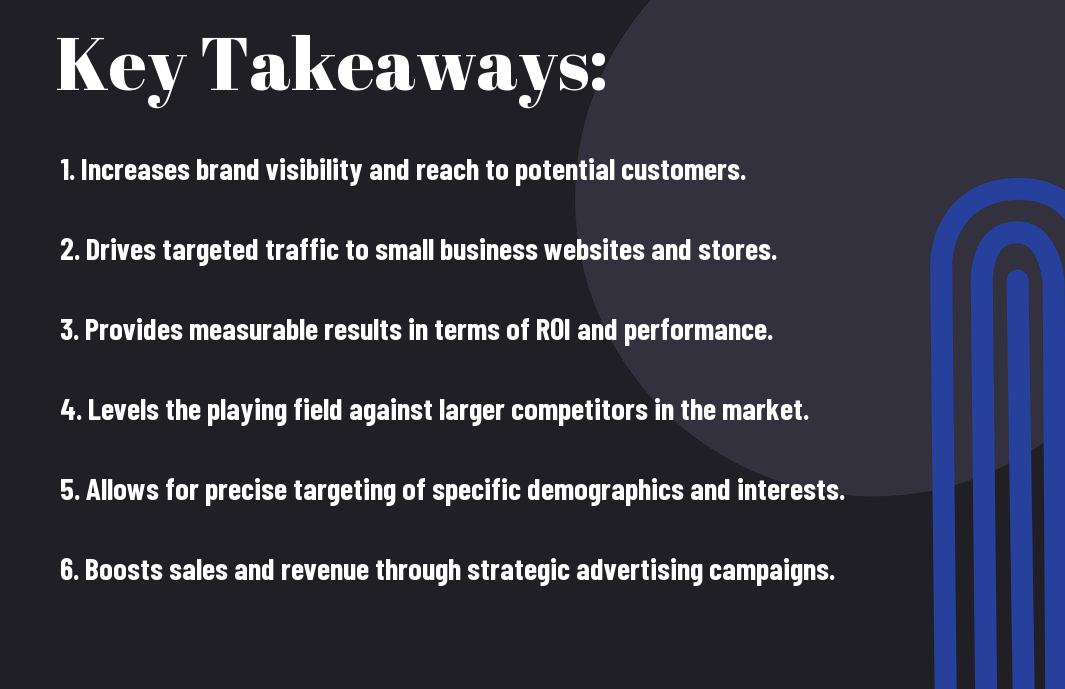Have you ever wondered about the efficacy of paid advertising for small businesses? In today’s competitive market, it’s crucial for small businesses to stand out and reach their target audience, and paid advertising can be a powerful tool to achieve this. By investing in paid advertising, you can expand your reach, increase brand awareness, and drive more traffic to your website. Furthermore, paid advertising allows you to target specific demographics and track the effectiveness of your campaigns, providing valuable insights to optimize your marketing strategy. In this blog post, we’ll explore the benefits and importance of paid advertising for small businesses, and how it can help you achieve your marketing goals.
Key Takeaways:
- Increased Visibility: Paid advertising allows small businesses to increase their visibility and reach a wider audience, especially in a competitive market.
- Targeted Marketing: With paid advertising, small businesses can target specific demographics, interests, and behaviors, ensuring that their message reaches the right audience.
- Measurable Results: Paid advertising provides small businesses with measurable results, allowing them to track the success of their campaigns and make data-driven decisions for future marketing efforts.
- Competitive Advantage: By investing in paid advertising, small businesses can level the playing field and compete with larger companies for consumer attention and market share.
- Brand Awareness: Paid advertising can help small businesses build brand awareness and recognition, leading to increased customer loyalty and trust in their products or services.

Understanding Paid Advertising
Obviously, as a small business owner, you understand the importance of marketing and promoting your products or services. But do you truly understand the power of paid advertising and how it can impact your business? In this chapter, we will delve into the world of paid advertising and why it is crucial for the success of your small business.
Definition and Types of Paid Advertising
Paid advertising refers to any type of advertising that you pay for, whether it’s online or offline. This can include pay-per-click (PPC) ads, display ads, social media ads, sponsored content, and more. Each type of paid advertising offers different benefits and reaches different audiences. It’s essential to understand the various types of paid advertising and how they can benefit your small business.
- Pay-Per-Click (PPC): This type of advertising allows you to bid on keywords and only pay when someone clicks on your ad.
- Display Ads: These are visual ads that appear on websites and can help create brand awareness.
- Social Media Ads: These ads appear on social media platforms and can be targeted to specific demographics and interests.
- Sponsored Content: This involves paying to have your content featured on third-party websites or platforms.
- Video Ads: These ads appear before, during, or after video content and can grab the viewer’s attention.
Any small business can utilize paid advertising to reach a larger audience, increase brand awareness, and drive more traffic to their website. It’s crucial to understand the different types of paid advertising and choose the right approach for your business goals.
Benefits of Paid Advertising for Small Businesses
When it comes to growing your small business, paid advertising offers a myriad of benefits. With paid advertising, you can target specific demographics, reach a larger audience, increase brand visibility, and generate leads more efficiently. Additionally, paid advertising allows you to track and measure your advertising efforts, giving you valuable insights into what works best for your business.
By investing in paid advertising, you can increase your online visibility and stand out from your competitors. It provides you with the opportunity to reach potential customers at the right time and place, ultimately driving more qualified traffic to your website and increasing your return on investment.
Planning Your Paid Advertising Strategy
Now that you understand the importance of paid advertising for small businesses, it’s time to dive into the planning phase. Your paid advertising strategy will play a crucial role in the success of your campaigns, so it’s important to approach it with careful consideration and attention to detail.
Target Audience and Market Research
When planning your paid advertising strategy, one of the first steps is to identify your target audience and conduct thorough market research. Understanding who your ideal customers are, their demographics, interests, and purchasing behaviors will allow you to create highly targeted and effective ads. By knowing your audience, you can ensure that your ad campaigns are reaching the right people at the right time, increasing the likelihood of conversion. Utilize tools such as Google Analytics, social media insights, and third-party research to gather data and gain insights into your target market.
Setting Budget and Goals
Setting a clear budget and goals for your paid advertising campaigns is essential for ensuring the success of your strategy. Determine how much you are willing to spend on your ads and allocate your budget across different platforms and campaigns. Additionally, establish specific, measurable, and achievable goals for your campaigns, such as increasing website traffic, generating leads, or boosting sales. By setting clear objectives, you can track the performance of your ads and make data-driven decisions to optimize your strategy for greater success. Remember, it’s important to continuously monitor and adjust your budget and goals based on the performance of your ads to maximize your return on investment.
By thoroughly understanding the needs and preferences of your target audience and setting clear budget and goals, you can develop a strategic approach to your paid advertising that will yield positive results for your small business. Keep in mind that this is just the beginning of the planning phase, and there are many other factors to consider as you fine-tune your strategy for maximum impact.
Executing Paid Advertising Campaigns
Unlike organic methods of marketing, paid advertising allows you to reach your target audience more quickly and effectively. By investing in paid advertising, you can ensure that your message is seen by potential customers who are already interested in your products or services. If you’re still unsure about the importance of paid advertising for small businesses, you can learn more in this helpful article on Why is advertising important for small businesses?
Choosing the Right Platforms for Your Business
When it comes to executing paid advertising campaigns, it’s crucial to choose the right platforms for your business. You don’t want to waste your budget on platforms that don’t align with your target audience. Research the demographics and behavior of your target customers to determine which platforms they’re most active on. This will help you make informed decisions about where to concentrate your paid advertising efforts.
Creating Compelling Ads and Measuring Success
Creating compelling ads is essential for the success of your paid advertising campaigns. You want to grab the attention of your audience and motivate them to take action. Use strong, compelling language and visuals that resonate with your target audience. Additionally, it’s crucial to measure the success of your campaigns. Track key metrics such as click-through rates, conversion rates, and return on investment to determine the effectiveness of your ads. This data will help you make adjustments to your campaigns and maximize your advertising budget.
Optimizing and Scaling Paid Advertising Efforts
To fully capitalize on the benefits of paid advertising for your small business, you need to optimize and scale your efforts over time. This means continually refining your ad campaigns to improve their performance and reaching a wider audience to increase your ROI. One common question that may arise is, “Why do small business owners not use paid advertising?” For some insights into this question, you can check out this discussion on Quora.
Analyzing Campaign Performance
After you’ve launched your paid advertising campaigns, it’s crucial to regularly analyze their performance. By closely monitoring key metrics such as click-through rates, conversion rates, and cost per acquisition, you can identify which ads are performing well and where adjustments are needed. You may discover that certain ad creatives or targeting options are driving strong results, while others are underperforming. This analysis will enable you to make informed decisions about where to allocate more of your advertising budget for maximum impact.
Adjusting Strategies for Better ROI
Based on the insights gained from analyzing your campaign performance, you can make strategic adjustments to improve your return on investment (ROI). This may involve refining your ad messaging, testing different audience segments, or experimenting with various bidding strategies. By continually adapting your approach, you can optimize your paid advertising efforts to ensure that you’re maximizing the value of every dollar spent. Your ability to pivot and refine your strategies based on real-time data will be crucial in achieving strong and sustainable results.

The Importance of Paid Advertising for Small Businesses
From above, it is clear that paid advertising is crucial for the success of small businesses. By reaching a targeted audience and increasing brand visibility, paid advertising can help you attract new customers and generate sales. Additionally, paid advertising allows you to track and measure the effectiveness of your marketing efforts, ensuring that you are getting a good return on your investment. In today’s competitive market, having a strong online presence is essential, and paid advertising is a powerful tool that can help you stand out from the competition. Overall, investing in paid advertising is an important strategy for small businesses looking to grow and thrive in the digital age.
FAQ
Q: Why is paid advertising important for small businesses?
A: Paid advertising helps small businesses reach a larger audience and increase brand awareness. It allows for targeted and precise marketing efforts, which can result in higher conversion rates and increased revenue.
Q: What are the benefits of paid advertising for small businesses?
A: Paid advertising offers immediate visibility and can provide a competitive edge in the market. It also allows for accurate tracking of results, enabling businesses to make data-driven decisions and optimize their marketing strategies.
Q: How does paid advertising differ from organic marketing efforts?
A: Paid advertising involves investing in ads that are displayed to a specific audience, whereas organic marketing relies on creating content and engaging with an audience without direct monetary investment. Paid advertising guarantees visibility, while organic efforts require time and consistency to yield results.
Q: What are the common types of paid advertising for small businesses?
A: Small businesses can utilize various forms of paid advertising, including search engine advertising (such as Google Ads), social media advertising (on platforms like Facebook and Instagram), display advertising, and influencer marketing. Each type offers unique advantages and can be tailored to specific business goals.
Q: How can small businesses make the most out of their paid advertising budget?
A: To maximize the impact of paid advertising, small businesses should conduct thorough research to identify their target audience and market trends. It’s important to set clear goals, create compelling ad content, and continuously monitor and adjust campaigns based on performance data. Additionally, testing different strategies and channels can help optimize the return on investment for paid advertising efforts.
